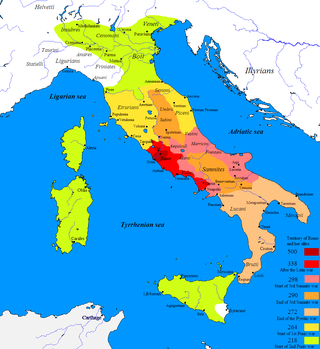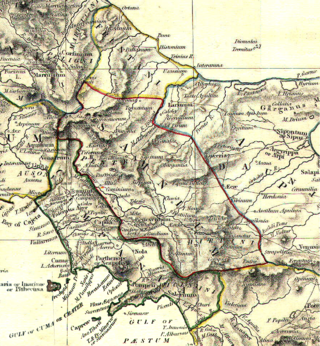Related Research Articles
During the 290s BC, Hellenistic civilization begins its emergence throughout the successor states of the former Argead Macedonian Empire of Alexander the Great, resulting in the diffusion of Greek culture throughout the Levant and advances in science, mathematics, philosophy, etc. Meanwhile, the Roman Republic is embroiled in war against the Samnites, the Mauryan Empire continues to thrive in Ancient India, and the Kingdom of Qin in Ancient China, the one which in the future will conquer its adversaries and unite China, begins to emerge as a significant power during the Warring States period.
Year 293 BC was a year of the pre-Julian Roman calendar. At the time it was known as the Year of the Consulship of Cursor and Maximus. The denomination 293 BC for this year has been used since the early medieval period, when the Anno Domini calendar era became the prevalent method in Europe for naming years.

The First, Second, and Third Samnite Wars were fought between the Roman Republic and the Samnites, who lived on a stretch of the Apennine Mountains south of Rome and north of the Lucanian tribe.
Marcus Valerius Corvus, also sometimes known as Corvinus, was a military commander and politician who served in the early-to-middle period of the Roman Republic. During his career he was elected consul six times, beginning at the age of twenty-three. He was appointed dictator twice and led the armies of the Republic in the First Samnite War. He occupied the curule chair twenty-one times throughout his career. According to legend, he lived to the age of one hundred.

The gens Valeria was a patrician family at ancient Rome, prominent from the very beginning of the Republic to the latest period of the Empire. Publius Valerius Poplicola was one of the consuls in 509 BC, the year that saw the overthrow of the Tarquins, and the members of his family were among the most celebrated statesmen and generals at the beginning of the Republic. Over the next ten centuries, few gentes produced as many distinguished men, and at every period the name of Valerius was constantly to be found in the lists of annual magistrates, and held in the highest honour. Several of the emperors claimed descent from the Valerii, whose name they bore as part of their official nomenclature.

Manius Curius Dentatus was a Roman general and statesman noted for ending the Samnite War and for his military exploits during the Pyrrhic War. According to Pliny, he was born with teeth, thus earning the surname Dentatus, "toothed."

The gens Fabia was one of the most ancient patrician families at ancient Rome. The gens played a prominent part in history soon after the establishment of the Republic, and three brothers were invested with seven successive consulships, from 485 to 479 BC, thereby cementing the high repute of the family. Overall, the Fabii received 45 consulships during the Republic. The house derived its greatest lustre from the patriotic courage and tragic fate of the 306 Fabii in the Battle of the Cremera, 477 BC. But the Fabii were not distinguished as warriors alone; several members of the gens were also important in the history of Roman literature and the arts.
Quintus Fabius Maximus Rullianus was a patrician, politician and soldier of the Roman Republic during the fourth and early third century BC. He was the son of Marcus Fabius Ambustus, of the patrician Fabii, was five times consul, dictator once, censor, and a hero of the Samnite Wars. He was brother to Marcus Fabius Ambustus, who was named after their father, and the grandfather of Quintus Fabius Maximus Verrucosus.
The gens Papiria was a patrician family at ancient Rome. According to tradition, the Papirii had already achieved prominence in the time of the kings, and the first Rex Sacrorum and Pontifex Maximus of the Republic were members of this gens. Lucius Papirius Mugillanus was the first of the Papirii to obtain the consulship in 444 BC. The patrician members of the family regularly occupied the highest offices of the Roman state down to the time of the Punic Wars. Their most famous member was Lucius Papirius Cursor, five times consul between 326 and 313 BC, who earned three triumphs during the Samnite Wars. Most of the Papirii who held office under the later Republic belonged to various plebeian branches of the family. Although the most illustrious Papirii flourished in the time of the Republic, a number of the family continued to hold high office during the first two centuries of the Empire.

Lucius Papirius Cursor was a celebrated politician and general of the early Roman Republic, who was five times consul, three times magister equitum, and twice dictator. He was the most important Roman commander during the Second Samnite War, during which he received three triumphs.

The Battle of Aquilonia, was fought between the Roman Republic and the Samnites during the Third Samnite War in 293 BC. This battle saw a large Samnite army that had gathered in the mountainous region of Aquilonia to stop Roman expansion, but was decisively defeated by the Roman legionaries led by consul Lucius Papirius Cursor.
Quintus Fabius Q. f. M. n. Maximus Gurges, the son of Quintus Fabius Maximus Rullianus, was consul in 292, 276, and 265 BC. After a dissolute youth and a significant military defeat during his first consulate, he was given the opportunity to salvage his reputation through the influence of his father, and became a successful general, eventually holding the highest honours of the Roman state. He was slain in battle during his third and final consulate.

The gens Minucia was an ancient Roman family, which flourished from the earliest days of the Republic until imperial times. The gens was apparently of patrician origin, but was better known by its plebeian branches. The first of the Minucii to hold the consulship was Marcus Minucius Augurinus, elected consul in 497 BC.

The gens Postumia was a noble patrician family at ancient Rome. Throughout the history of the Republic, the Postumii frequently occupied the chief magistracies of the Roman state, beginning with Publius Postumius Tubertus, consul in 505 BC, the fifth year of the Republic. Although like much of the old Roman aristocracy, the Postumii faded for a time into obscurity under the Empire, individuals bearing the name of Postumius again filled a number of important offices from the second century AD to the end of the Western Empire.
The gens Carvilia was a plebeian family at ancient Rome, which first distinguished itself during the Samnite Wars. The first member of this gens to achieve the consulship was Spurius Carvilius Maximus, in 293 BC.
Spurius Carvilius C. f. C. n., later surnamed Maximus, was the first member of the plebeian gens Carvilia to obtain the consulship, which he held in 293 BC, and again in 272 BC.
Gaius Junius Bubulcus Brutus was a Roman general and statesman, he was elected consul of the Roman Republic thrice, he was also appointed dictator or magister equitum thrice, and censor in 307 BC. In 311, he made a vow to the goddess Salus that he went on to fulfill, becoming the first plebeian to build a temple. The temple was one of the first dedicated to an abstract deity, and Junius was one of the first generals to vow a temple and then oversee its establishment through the construction and dedication process.
The gens Domitia was a plebeian family at ancient Rome. The first of the gens to achieve prominence was Gnaeus Domitius Calvinus, consul in 332 BC. His son, Gnaeus Domitius Calvinus Maximus, was consul in 283, and the first plebeian censor. The family produced several distinguished generals, and towards the end of the Republic, the Domitii were looked upon as one of the most illustrious gentes.
The gens Genucia was a prominent family of the Roman Republic. It was probably of patrician origin, but most of the Genucii appearing in history were plebeian. The first of the Genucii to hold the consulship was Titus Genucius Augurinus in 451 BC.
The Battle of Imbrinium was fought in 325 BC during the Second Samnite War between the Roman Republic, led by the magister equitum, Quintus Fabius Maximus Rullianus and the Samnites near Imbrinium, a city in Samnium.
References
- ↑ Livy, Roman History, X, 39-40
- ↑ Valerius Maximus, On Memorable Deeds and Sayings, Book VII, 2
- ↑ Orosius, III, 22
- ↑ Frontinus, Stratagems, II, 4
- ↑ Fasti triumphales read online p. 97.
- ↑ Livy, Roman History, Book X, 46
- ↑ (in French) Karlis Vé, En lisant Tite-Live : la date et le contexte du vœu de la construction du temple de Quirinus, Bulletin de l'Association Guillaume Budé, 1, 2010, pages 197-209
- ↑ Pliny the Elder, Natural History, VII, 60
- ↑ Frontinus, Stratagems, III, 3
- ↑ (in French) Claudine Auliard, Victoires et triomphes à Rome. Droit et réalités sous la République, Besançon, Institut des Sciences et Techniques de l'Antiquité, coll. « ISTA » (no 817), 2001, 7-185 p., p. 177.